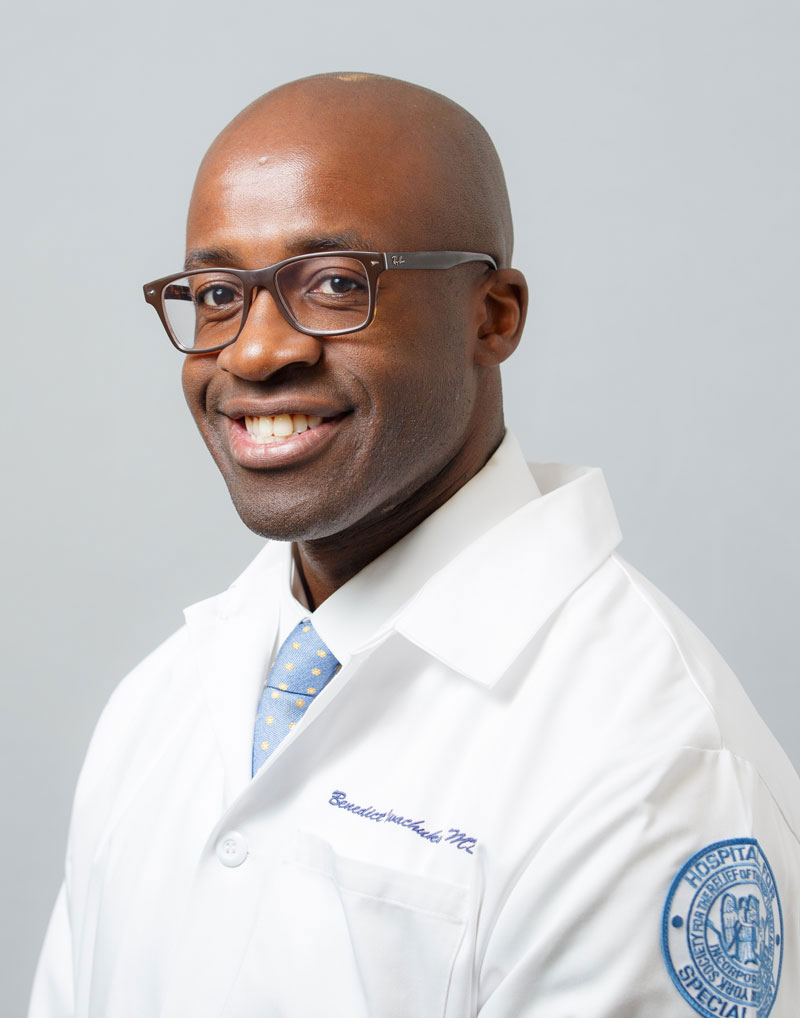Quadriceps Tendon Tear Specialist

Are you involved in activities or sports that include running or jumping? Have you been previously diagnosed with quadriceps tendinitis? If so, you may have torn your quadriceps tendon. HSS knee specialist Dr. Benedict Nwachukwu can provide a diagnosis as well as surgical and nonsurgical treatment options for patients in Manhattan, Brooklyn, and New York City, NY. Contact Dr. Nwachukwu’s team today!
What is a quadriceps tendon rupture?
The quadriceps tendon is a strong piece of tissue at the top of the patella (kneecap) that connects the quadriceps muscles of the thigh to the patella. By connecting the thigh muscles to the kneecap, the quadriceps tendon allows us to bend and straighten our leg. Without a functional quadriceps tendon, it can be very difficult to walk. Dr. Benedict Nwachukwu, orthopedic knee specialist, treats patients in Manhattan, Brooklyn, New York City and the surrounding New York boroughs who are experiencing pain associated with a quadriceps tendon rupture.
What causes a quadriceps tendon rupture?
Patients who sustain a rupture of the quadriceps tendon will often report a traumatic episode such as a fall, buckling or forced knee flexion. Ruptures of the quadriceps tendon will also commonly occur in active middle-aged and older patients who are involved in jumping and running. As we age, our tendons can degenerate and fray, predisposing us to tendon rupture with vigorous activity. Persons with pre-existing quadriceps tendinitis (inflammation of the quadriceps tendon) are also at increased risk of quadriceps tendon rupture. In some people the presence of a pre-existing condition such as rheumatoid arthritis, diabetes mellitus, infection, and chronic renal failure can weaken the quadriceps tendon and predispose to rupture. Use of certain medications such as steroids and some antibiotics can also weaken the quadriceps and predispose individuals to rupture of the quadriceps tendon.
What are the symptoms of a quadriceps tendon rupture?
Quadriceps tendon ruptures are often associated with the sensation of a “pop” in the knee at the top of the kneecap. Commonly, patients with a tear of the quadriceps tendon will have difficulty straightening the knee from a seated position or lifting the leg in the air when it is fully straight.
How are quadriceps tendon ruptures diagnosed?
Dr. Nwachukwu will often suspect a quadriceps tendon rupture based on the clinical history alone. In the office, Dr. Nwachukwu will perform a thorough examination and will assess the patient’s ability to perform a straight-leg raise, as well as other functions that require activation of the quadriceps tendon. Inability to perform these functions will often indicate a quadriceps tendon rupture. In the majority of people with this type of injury, there will be a physical defect in the area where the tendon attaches to the kneecap. Dr. Nwachukwu will often feel for this defect as another indication of injury. In most cases further imaging will be performed in order to confirm the diagnosis. An x-ray of the knee is an important initial study to confirm that there are no fractures or other bone abnormalities. Ultimately, an MRI of the knee is the best diagnostic study for confirming rupture of the quadriceps tendon. If a patient has a medical problem which prevents an MRI, an ultrasound of the knee can also be very effective in providing confirmation.
Imaging such as MRI or ultrasound can be helpful in determining whether the quadriceps tendon is fully or partially torn. In certain patients, there is enough quadriceps tendon still attached to the kneecap and non-operative treatment can be pursued so that the tendon can heal itself. If the quadriceps tendon is fully torn (or the vast majority is torn), Dr. Nwachukwu will recommend a procedure called “Quadriceps Tendon Repair”
When should I seek care if I think I have a quadriceps tendon rupture?
If you are concerned that you may have injured your quadriceps tendon, you should immediately seek the care of an orthopedic doctor. Dr. Nwachukwu will evaluate you to confirm if you have injured your quadriceps tendon. Prompt diagnosis will allow you to better understand whether non-surgical or surgical treatment is most appropriate. In patients needing non-surgical treatment, it is important to place the knee in a brace in order to allow the tendon to heal and to prevent the need for surgery further down the road. In patients requiring surgery to repair the tendon, prompt surgical attention is important to minimize the risk of surgical complication and to increase the chance for the tendon to be repaired using the patient’s own tissue.
For more information on quadriceps tendon ruptures of the knee, or to talk about the treatment options available for your knee pain, please contact the office of Benedict Nwachukwu, MD, orthopedic knee, hip and shoulder specialist serving Manhattan, Brooklyn, New York City and surrounding New York boroughs.
Location
610 W 58th Street
New York, NY 10019
148 39th Street, 7th Floor
Brooklyn, NY 11232
Fax: 646-885-8252
Office Hours
HSS Sports Medicine Institute West Side
Monday: 8:00 am – 5:00 pm
Tuesday: 8:00 am – 5:00 pm
Wednesday: 8:00 am – 5:00 pm
Thursday: 8:00 am – 5:00 pm
HSS Brooklyn
Friday: 8:00 am – 5:00 pm
